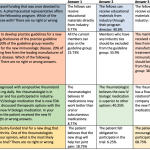Patients who enroll in clinical trials, whether they know it or not, need to be able to trust an IRB to make sure the trial is ethical and safe, he said.
“Clinical research is so important—there are so many serious diseases and health conditions that we must understand to improve the health of the public,” said Dr. Laura Weiss Roberts of Stanford University School of Medicine in California, who wrote a commentary on the new results. “For this reason, a strong IRB is really the ‘best friend’ to great clinical researchers.”
“Professionals should, in my view, engage in many different kinds of activities that make the best use of their expertise in society,” which generates potential conflicts, she told Reuters Health by email.
Conflicts of interest should not be misunderstood or vilified, she said.
“Some conflicts are incompatible with certain roles and activities, but many role conflicts and resulting conflicts of interest can be managed very effectively,” Roberts said.


